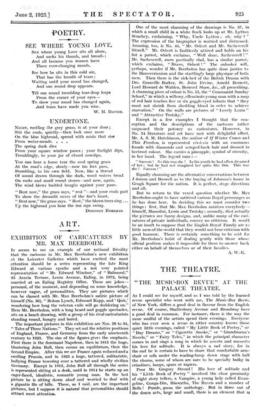ART.
EXHIBITION OF CARICATURES BY MR. MAX BEERBOHM.
IT seems to me an example of our national frivolity that the cartoons in Mr. Max Beerbohm's new exhibition at the Leicester Galleries which have excited the most attention should be a series representing the late King Edward at various epochs and a not very pointed representation of " Mr. Edward Windsor," of " Balmoral," 85 Acacia Terrace, Lenin Avenue, Ealing, in 1972, being married at an Ealing Registry Office. These are jokes— personal, of the moment, and depending on some knowledge, however vague, of personalities. They are pictures which can be classed with Mr. Max Beerbohm's satiric picture of himself (No. 50), " Bohun Lynch, Edmond Kapp, and Quiz,' wondering how long the veteran exile will go doddering on." Here Mr. Beerbohm, with a long beard and goggle spectacles, sits on a beach drawing, with a group of his rival caricaturists standing round, hungry and bored.
The important pictures in this exhibition are Nos. 26 to 34, " Tales of Three Nations." They set out the relative positions of England, France, and Germany from the early nineteenth century to 1923. The size of the figures gives the emphasis. First there is the dominant Napoleon, then in 1815 the huge, blustering John Bull, then comes an equilibrium, then the Second Empire. After this we see France again reduced and a swelling Prussia, and in 1923 a huge, tattered, militaristic, bullying France towering over a tattered and wholly civilian Germany. Except in 1815, John Bull all through the series is represented sitting at a desk, until in 1914 he starts up an eager-faced, idealistic, romantic young man. In the last picture he is sitting down aloof and worried to deal with a gigantic file of bills. These, as I said, are the important pictures, but I suppose it is natural that personalities should attract most attention. One of the most charming of the drawings is No. 37, in which a small child in a white frock looks up at Mr. Lytton Strachey, exclaiming, " Why, Uncle Lytton ; oh, why ? The expression of the biographer is worried and distressed. Amusing, too, is No. 48, " Mr. Osbert and Mr. Sacheverell Sitwell." Mr. Osbert is faultlessly attired and holds on his fist a parrot, which exclaims, " Well done, Sacheverell ! " Mr. Sacheverell, more poetically clad, has a similar parrot, which exclaims, " Bravo, Osbert ! " The onlooker will, perhaps, wonder if Mr. Beerbohm has quite done justice to the Hanoverianism and the startlingly large physique of both men. Then there is the sick-bed of the British Drama with Drs. Granville Barker, St. John Ervine, Arnold Bennett, Lord Howard de Walden, Bernard Shaw, &c., all prescribing.
A charming piece of colour is No. 55, the " Communist Sunday School," in which a willowy, effeminate young man with a mop of red hair teaches five or six goggle-eyed infants that " they must not shrink from shedding blood in order to achieve starvation." On the walls are pictures of " Lovely Lenin " and " Attractive Trotsky."
Except in a few examples I thought that the con- ception and the descriptions of the cartoons rather surpassed their potency as caricatures. However, in
No. 54 literature and art have met with delightful effect. Mr. A. S. M. Hutchinson, the author of If Winter Comes and This Freedom, is represented tyis-a-vis with an enormous female with diamonds and scraped-back hair and dressed in beetroot colour. She carries a pineapple, symbol of eternity, in her hand. The legend runs :- "Success! So this was she ! In his youth he had often dreamed of her ; but he had not imagined her quite like this. This was she 1 Success ! "
Equally charming are the alternative conversations between J Almon and Boswell as to the buying of Johnson's house in Gough Square for the nation. It is perfect, stage directions and all.
But to return to the vexed question whether Mr. Max Beerbohm ought to have satirized various Royal personages as he has done here. In deciding this we must consider two things : first, that Mr. Max Beerbohm satirizes everybody— himself, Mussolini, Lenin and Trotsky ; secondly, that actually the pictures are funny designs, and, unlike many of the cari- catures of private individuals, convey no criticism. It would be an insult to suppose that the English Royal Family are sl little men-of-the-world that they would not bear criticism with good humour. There is certainly something to be said for Mr. Beerbohm's habit of dealing gently with those whose official position makes it impossible for them to answer back either on behalf of themselves or of their families.
A. W.-E.










































 Previous page
Previous page